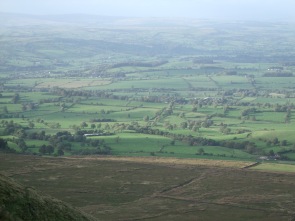At the time of the Restoration, the opening of a locked chest in a remote hovel in Westmorland by a young woman reveals the unexpected life story of her recently-deceased father, a man she has barely known thanks to his self-imposed silence…
‘A Certain Measure of Perfection’ is constructed around genuine historical characters, including the minister himself, Roger Brierley – a man forgotten by history but one whose abilities went far beyond his rather unexceptional education. Working from an obscure Northern backwater and aided only by candle and condenser, miles from the centres of ecclesiastical power and learning, he completed one of the most extraordinary translations of the century, bringing the dreaded ‘Teutonic theology’ to life in the English language and sending a ‘movement of the Spirit’ not only across the hills of the North but subsequently also through the tightly cramped, jettied-building streets of the City of London.
Over the five volumes of the book, Matthew Brearley, our narrator, takes us on a journey from a Northern English rural backwater through Brierley’s arrest and Matthew’s own time in Grindleton with the curate’s wife, via a repository of Familist texts on the Fens to a London irreversibly sliding towards the chaos of outright civil war.
CLICK ON THE DROP DOWN MENU FOR MORE INFORMATION
If you are viewing on an old version of Internet Explorer, you may need to click on the images below:
THE THEOLOGIA, BRIERLEY & THE GRINDLETONIANS
ON PERFECTISM
EXTRACTS




Oh, yes, the Grindletonians! An utterly amazing flash in history.
LikeLiked by 10 people
Yes 🙂
LikeLiked by 3 people
LikeLiked by 3 people
Sounds interesting, Simon 🙂 🙂
LikeLiked by 2 people
🙂 thanks
LikeLiked by 1 person
However, the influence was actually around rather longer than most people think.
LikeLiked by 1 person
Thank you for liking my blog An Englishmen Goes To Transylvania!. Oddly my sister lives in Sawley, just two miles from Grindleton! She and I have spent many a happy evening in the Lower Buck there – I will point her to your blog/book as she is keen on history…
LikeLiked by 4 people
thank you Karl
LikeLike
I am also arranging to a lecture at Grindleton Historical Society (newly formed) in March – will update on this blog.
LikeLiked by 2 people
You may be interested in the reviews:
LikeLiked by 2 people
Awesome insight. Thank you for opening up this interesting piece of history. A fascinating period of time.
LikeLiked by 3 people
You are welcome.
LikeLiked by 1 person
I am doing a presentation up in Grindleton to the historical society there next month
LikeLiked by 1 person
Sounds perfect. Great location! Look forward to hearing about it.
LikeLiked by 2 people
Looks like a very interesting study and book. I’m a musician, and it is interesting to see the influence of theological ideas on what was perfect and imperfect in musical intervals used in sacred music. We take for granted the names, perfect unison, octaves and 5ths but it refers to a time when these implied godliness and other intervals were the devil’s work. And thinking about other philosophical wanderings I have made, I wonder how the word ‘perfection’ could be compared with the word ‘unity’. Looking forward to reading your book.
LikeLiked by 4 people
ah – well, tell me more. van barrefelt referred to himself as the ‘voice of the uniform mind’
LikeLiked by 2 people
we can talk more about van barrefelt (hiel) and the uniform life if you like – happy to do so
LikeLiked by 2 people
Dear Simon, this should be great searching and writing. And what you did is also great, I admire so much. Your writing skill is amazing, fascinated me, especially your comment 🙂 I really love your country and this language. But I am not perfect 🙂 This was my dream to be same with this language as my own. I am talking about this, because, as your people in your language, maybe it won’t be easy for me to read, but piece by piece I try to read and to understand. The first passage fascinating and makes you to read… I love history, archeology. But this is what I haven’t known anything before, it should be interesting. Sorry if I make a lot of explanations. I have just seen your other blog, now I am going to visit it, I can see there are photographs 🙂 you know this is my best part. Thank you, Good Luck for your books. Love, nia
LikeLiked by 2 people
This sounds fascinating!
LikeLiked by 2 people
Incredibly fascinating historical research, especially the links with Sephardic (Spanish Jewish) Kabbalah, and riveting writing style as well. My kind of reading!
LikeLiked by 2 people
ah – very many thanks for these comments
LikeLiked by 2 people
there is actually material on that in the book’s footnotes
LikeLiked by 2 people
I am looking forward to reading it! I can actually make sense of Gematria (letters that are equivalent to numbers which are, in turn, equivalent to other words or phrases).
LikeLiked by 2 people
yes i know about gematria
LikeLiked by 1 person
I didn’t mean to sound patronizing, and I am sorry if it came out like that.
LikeLiked by 1 person
oh not at all – not taken in that way whatsoever 🙂
LikeLiked by 1 person
🙂
LikeLiked by 1 person
And I have just realised why you did not comment on that page itself – because there is no comments box! I am on a bus but it should work now :-). There is actually also the very interesting case of John Traske as well…
LikeLiked by 1 person
Thanks for following my blog, which is much appreciated.
Good luck with your book!
Best wishes, Pete.
LikeLiked by 2 people
many thanks
LikeLike
I spent years visiting family in Clitheroe and Chatburn and never knew about the Grindletonians – thanks for this. It;s always good to learn, 🙂
LikeLiked by 3 people
Thanks for your comment. Many of the same names still concentrated in those places
LikeLiked by 2 people
This sounds really interesting, I love history and learning about different areas, and the stories in their past so I’m intrigued! Made sure I followed your blog for further updates! And thank you too for all the kind comments so far on my blog as well 🙂 – Tasha
LikeLiked by 2 people
Oh, you are welcome Natasha. And thank you for the interest in A Certain Measure of Perfection.
LikeLiked by 2 people
More than welcome!
LikeLiked by 1 person
Fist Simon thanks for the follow and then for the lead in to this fascinating history; some of the names and the very basic story resonates but wow from a brief read here there’s some tale told there. Best of luck wth both blog and book.
LikeLiked by 2 people
More than welcome – thanks for the comment. Regards, SIMON
LikeLiked by 1 person
Can hardly believe that anyone has time to blog and write, but hats off to you for doing both! Thanks for following our blog, Oh, the Places We See. Hopefully, you’ll have a little time left to read about our travels. Best wishes for much success in all your endeavors!
LikeLiked by 2 people
Yes, the book was completed several years ago now. I wrote a lot of it whilst commuting.
LikeLiked by 2 people
A major issue at the time was whether you should take your hat off by the way!!!!
LikeLiked by 2 people
I do like the title.
LikeLiked by 2 people
Many thanks Ellen
LikeLiked by 2 people
It was actually something that Brierley himself said towards the end of his life, looking back on his more radically minded period. Even now, he says, I still think that perhaps Luther and one or two others arrived at a certain measure of perfection. Later I realised that from the perspective of assurance it can also be played the other way as a measure of certain perfection.
LikeLiked by 2 people
Ah, but the good part is that you heard the resonance in that phrase and used it as a title.
LikeLiked by 2 people
yes
LikeLiked by 2 people
This sounds absolutely fascinating… must find the book and explore you too…
LikeLiked by 2 people
Many thanks for your comment.
I see you are a a writer so I will have a wander around your blog as well 🙂
LikeLiked by 1 person
Thanks for following my blog – what an interesting topic for your book. As you probbly know, I study the Separatists (Pilgrims) another sect. There will be a shout out to you in a post soon.
LikeLiked by 2 people
Do tell me more about what you are studying.
LikeLike
I am doing research for a historical novel about the Pilgrims. I grew up in Plymouth and worked at Plimoth Plantation, so I have a nature in and background!
LikeLiked by 2 people
🙂 All sorts of ideas were exported including some that the majority were keen to forget
LikeLiked by 2 people
Nice connection! Anyway, called by to leave my thanks for your recent decision to follow Learning from Dogs. Thank you!
LikeLiked by 1 person
Fascinating!
Many thanks for stopping by my Travel and Photography blog.
LikeLiked by 1 person
Many thanks for visiting too
LikeLiked by 1 person
Many thanks for stopping by on my website. Hope you make it down to the exhibition on the work of Nicholas Hilliard & Isaac Oliver now on at the NPG. There is also a conference at the NPG on 28/29 March on all aspects of the work of the portrait miniaturist. Unfortunately my submission to give a paper identifying one of Hilliard’s sitters didn’t make it to the final cut because that is not what they were after.
LikeLike
but it sounds very interesting
LikeLike
Thank you for “like” my comment on “Unknown Flower”
LikeLike
Thanks for your comment on my post about The Weirdstone of Brisingamen … it won’t let me answer it because I messed up the Facebook link so I deleted it and reposted it, so it won’t let me answer comments on the original! Yes – the author took a lot of the names in this from Norse mythology. Ragnarok’s mentioned as well.
LikeLiked by 1 person
it even spilled down into beowulf
LikeLiked by 1 person
It’s a great title.
LikeLike
thanks
LikeLike